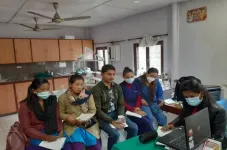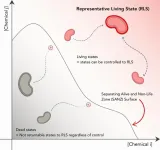(Press-News.org) Culturally appropriate women-centred interventions can help healthcare systems respond to domestic violence, research has found. HERA (Healthcare Responding to Violence and Abuse) has been co-developing and evaluating a domestic violence and abuse healthcare intervention in low- and middle-income countries for the past five years. This National Institute for Health and Care Research (NIHR) Global Research Group will report their findings, and publish a PolicyBristol report, at a conference in London today [27 November].
The Group was co-led by the University of Bristol and London School of Hygiene & Tropical Medicine. Specific country studies were led by the University of Sao Paulo (Brazil), Kathmandu University (Nepal), An-Najah National University (occupied Palestinian territories), and University of Peradeniya (Sri Lanka). Domestic violence and abuse (DVA) against women is a significant concern in each of these countries, with a prevalence of 23 per cent in Brazil, 27 per cent in Nepal, 29 per cent in the occupied Palestinian territories (oPt), and 24 per cent in Sri Lanka.
Following implementation of the HERA programme, rates of identification of DVA in participating health services increased by 78 per cent in Brazil, 100 per cent in Nepal and 69 per cent in Sri Lanka1. There was a 24 per cent decrease in identification of women experiencing DVA in the oPt, partly due to escalating violence in the Israeli occupation2.
Healthcare worker confidence and motivation to address domestic violence improved, with healthcare workers reporting increases in their readiness to identify, inquire about and respond to domestic violence by documenting cases, making referrals, and offering ongoing support. In Nepal, there was a slight decrease in healthcare worker confidence to offer ongoing support due to the healthcare clinics becoming Covid isolation wards.
Context matters
HERA aimed to strengthen each country’s health system response to DVA by focusing on women-centred care, context-specific adaptations, and healthcare leadership to drive change. It was informed by World Health Organization clinical guidance. The study took place in health services serving socioeconomically disadvantaged communities, focusing on sexual and reproductive health care. This included primary healthcare facilities in Brazil, Nepal, and the oPt, as well as in district general hospitals in Sri Lanka.
Key elements of the intervention were:
training, which focused on: enhancing understanding of women's experiences, building skills for empathy, asking questions in a non-judgmental manner, and providing first-line support
improving recording practices
establishing care pathways for affected women within and beyond the health system
The adaptation and implementation of HERA in the four countries was shaped by their distinct socio-cultural, political and economic contexts. This included issues such as: drug cartel activities in Brazil and social violence relating to the Israeli occupation of the West Bank2; gender norms and variations in laws regarding violence against women; and challenges posed by the COVID-19 pandemic.
Impact
Training has been vital to address domestic violence in the four countries.
In Brazil, the south region hopes to expand HERA training to all services in that region, including health services other than primary healthcare (mental health and emergency services, specially).
The Palestinian Ministry of Health will invite healthcare providers who participated in the "Train the Trainer" programme to train their colleagues in future gender-based violence training sessions.
The training material developed and used for the HERA intervention in Sri Lanka - to increase awareness and response to DVA among healthcare professionals (HCPs) - has been discussed with the Family Health Bureau (FHB) of the Ministry of Health. It is hoped the material will be used in their HCP training program in 2025.
The HERA team in Nepal was instrumental in advocating for a Gender Transformative Approach (GTA) to train healthcare providers along with the United Nations Population Fund (UNFPA). Currently, the governmental training manual on healthcare response to GBV is being revised to incorporate GTA. The HERA team will train providers/medical students/nursing students/physiotherapy students from different departments and institutions to use the GTA approach.
Recommendations
The report makes a number of policy and practice recommendations, which include:
Strengthen health system linkages with local leaders, women’s organisations and non-governmental organisation (NGO)-led services
Incorporate a robust women-centred perspective in training programmes, grounded in an understanding of gender inequality
Develop targeted interventions for managers to drive organisational change
Expand referral options for women at various stages of readiness to seek help
Maintain a simple, unified record system for documenting DVA
Establish targets and performance indicators for DVA responses in healthcare systems
Gene Feder, Professor of Primary Care in the Centre for Academic Primary Care at the University of Bristol and co-Director of HERA, said: “Violence against women is a severe violation of human rights rooted in gender and economic inequalities, affecting nearly one in three women globally. The rates are even higher in some low- and middle-income countries. Health systems play a crucial role in addressing the immediate health needs of women and supporting their pathways to safety and recovery. In HERA we found that health systems in diverse countries in the global South could be strengthened to identify and respond to the needs of women experiencing domestic violence.”
Loraine Bacchus, Professor of Global Public Health at the London School of Hygiene & Tropical Medicine and co-Director of HERA, explained: “HERA has shown that culturally appropriate, women-centred programmes can strengthen healthcare system responses to domestic violence. By collaborating with local health services and addressing the specific challenges faced by their local communities, it is possible to improve healthcare worker confidence and build trust with the women they support. This work highlights the value of country-specific strategies to improve how doctors and other healthcare workers respond to violence against women.”
Professor Ana Flavia d’Oliveira, Principal Investigator, University of São Paulo, said:” Our greatest achievement and the true success of the HERA intervention lie in increasing the identification of domestic violence cases without resorting to mechanical questions or obtaining irrelevant answers. This increase signifies a more attentive and perceptive approach toward women, with a deeper understanding of gender, race, and class inequalities. It also fosters the belief in shared decision-making.
“Primary care's role in supporting these cases is crucial, serving as an entry point to the rights protection network, despite its limitations. HERA has developed an approach to posing questions, providing support, and making referrals that avoids judgment and re-victimisation. Instead of viewing patients as helpless, it recognises women as empowered individuals capable of making decisions and accepting their consequences.”
Amira Shaheen, Assistant Professor and Principal Investigator, An Najah National University said: "We are deeply committed to advancing healthcare responses to abuse and violence. This initiative not only seeks to strengthen the capacity of our healthcare systems but also to provide a lifeline for those affected. Our work reflects the resilience of communities and the critical role of healthcare in safeguarding human dignity and well-being."
Dr Poonam Rishal, Principal Investigator, Kathmandu University, said: “HERA Nepal has been a collaborative journey to contribute to meaningful work aligning with our passion for fostering change for women who experience violence and abuse. It has been a learning of best practices and challenging existing research that can support policy implementation and amplify voices of women, enriching professional and personal development. Camaraderie, transparency and non-hierarchical leadership were pivotal to its success.”
Professor Thilini Rajapakse, Principal Investigator, University of Peradeniya, said: “Our main aim is to improve the healthcare response to domestic violence, and to increase awareness about this key issue. We also strongly advocate for improving support and service provision for people experiencing domestic violence, and exploring socio-culturally appropriate ways to do so. HERA has been an important part of our programme.”
This research was funded by the NIHR (17/63/125) using UK aid from the UK Government to support global health research. The views expressed in this publication are those of the authors and not necessarily those of the NIHR or the UK Government. The views expressed in this article are those of the authors and not necessarily those of the NIHR or the Department of Health and Social Care.
PolicyBristol report
‘Health system interventions can improve domestic violence support but context matters’ by Loraine J Bacchus, Manuela Colombini (London School of Hygiene & Tropical Medicine), Stephanie Pereira, Ana Flavia d’Oliveira, Lilia Blima Schraiber (University of São Paulo), Poonam Rishal, Kunta Pun (Kathmandu University), Thilini Rajapakse (University of Peradeniya), Amira Shaheen, Abdulsalam Alkaiyat (An-Najah National University), Claudia Garcia Moreno (World Health Organization), Gene Feder (University of Bristol) by PolicyBristol
Papers
‘Healthcare professionals' own experiences of domestic violence and abuse: a meta-analysis of prevalence and systematic review of risk markers and consequences’ by Dheensa S, McLindon E, Spencer C et al. in Trauma Violence Abuse
‘Interventions in sexual and reproductive health services addressing violence against women in low-income and middle-income countries: a mixed-methods systematic review’ by Lewis NV, Munas M, Colombini M, et al. in BMJ Open
‘Barriers to help-seeking from healthcare professionals amongst women who experience domestic violence - a qualitative study in Sri Lanka’ by Silva, T, Agampodi, T, Evans, M. et al. in BMC Public Health
‘Engaging early career researchers in a global health research capacity-strengthening programme: a qualitative study‘ by Hawcroft C, Rossi E, Tilouche N et al in Health Research Policy and Systems
'Evaluation of an intervention to improve Primary Health Care’s response to cases of domestic violence against women - São Paulo, Brazil‘ by Pereira S, Azeredo YN Schraiber, LB et al. in Ciência & Saúde Coletiva
‘Ethical challenges in global research on health system responses to violence against women: a qualitative study of policy and professional perspectives‘ by Lewis NV, Kalichman B, Azeredo et al. in BMC Medical Ethics
‘Comparing health systems readiness for integrating domestic violence services in Brazil, occupied Palestinian Territories, Nepal and Sri Lanka’ by Colombini M, Shrestha S, Kalichman B et al. in Health Policy and Planning
‘Interventions that prevent or respond to intimate partner violence against women and violence against children: a systematic review‘ by Bacchus LJ, Colombini M, Pearson I et al. in Lancet Public Health
‘Evaluation of a domestic violence training and support intervention in Palestinian primary care clinics: a mixed method study‘ by Joudeh N, Shaheen A, Bacchus LJ et al. in BMC Primary Care
END
Intervention improves the healthcare response to domestic violence in low- and middle-income countries
2024-11-27
ELSE PRESS RELEASES FROM THIS DATE:
State-wide center for quantum science: Karlsruhe Institute of Technology joins IQST as a new partner
2024-11-27
The mission of IQST is to further our understanding of nature and develop innovative technologies based on quantum science by leveraging synergies between the natural sciences, engineering, and life sciences. "Many KIT scientists already successfully support IQST with their expertise as Fellows. All the more I am pleased that the Karlsruhe Institute of Technology is now joining our interdisciplinary centre as an institution," says IQST Director Prof. Stefanie Barz. "This will strengthen networking within the academic quantum community in Baden-Württemberg," emphasizes ...
Cellular traffic congestion in chronic diseases suggests new therapeutic targets
2024-11-27
***Embargoed until November 27 at 11 AM EST***
Chronic diseases like type 2 diabetes and inflammatory disorders have a huge impact on humanity. They are a leading cause of disease burden and deaths around the globe, are physically and economically taxing, and the number of people with such diseases is growing.
Treating chronic disease has proven difficult because there is not one simple cause, like a single gene mutation, that a treatment could target. At least, that’s how it has appeared to scientists. However, research from Whitehead Institute Member Richard Young and colleagues, published in the journal ...
Cervical cancer mortality among US women younger than age 25
2024-11-27
About The Study: This study found a steep decline in cervical cancer mortality among U.S. women younger than 25 years between 2016 and 2021. This cohort of women is the first to be widely protected against cervical cancer by human papillomavirus (HPV) vaccines. The findings from this study in the context of other published research suggest that HPV vaccination affected the sequential decline in HPV infection prevalence, cervical cancer incidence, and cervical cancer mortality.
Corresponding ...
Fossil dung reveals clues to dinosaur success story
2024-11-27
In an international collaboration, researchers at Uppsala University have been able to identify undigested food remains, plants and prey in the fossilised faeces of dinosaurs. These analyses of hundreds of samples provide clues about the role dinosaurs played in the ecosystem around 200 million years ago. The findings have been published in the journal Nature.
“Piecing together ‘who ate whom’ in the past is true detective work,” says Martin Qvarnström, researcher at the Department of Organismal Biology and lead author of the study. “Being able to examine what animals ate and how they interacted with their environment helps us understand what enabled ...
New research points way to more reliable brain studies
2024-11-27
Brain-wide association studies, which use magnetic resonance imaging to identify relationships between brain structure or function and human behavior or health, have faced criticism for producing results that often cannot be replicated by other researchers.
A new study published in Nature demonstrates that careful attention to study design can substantially improve the reliability of this type of research. For the study, Kaidi Kang, a biostatistics PhD student, Simon Vandekar, PhD, associate professor of Biostatistics, and colleagues analyzed data from more than 77,000 brain scans across 63 studies.
The ...
‘Alzheimer’s in dish’ model shows promise for accelerating drug discovery
2024-11-27
A decade ago, researchers introduced a new model for studying Alzheimer’s disease. Known as “Alzheimer’s in a dish,” the model uses cultures of mature brain cells suspended in a gel to recapitulate what takes place in the human brain over 10 to 13 years in just six weeks. But does the model truly produce the same changes that take place in patients? In a new study, researchers from Mass General Brigham, in collaboration with colleagues at Beth Israel Deaconess Medical Center (BIDMC), created an algorithm to assess, in an unbiased manner, how well models of Alzheimer’s disease ...
Ultraprocessed food intake and psoriasis
2024-11-27
About The Study: The results of this study showed an association between high ultraprocessed food intake and active psoriasis status. After adjustments for age, body mass index (BMI), alcohol intake, and comorbidities, the results remained significant, suggesting that ultraprocessed food intake has a proinflammatory action separate from high BMI.
Corresponding Author: To contact the corresponding author, Emilie Sbidian, MD, PhD, email emilie.sbidian@aphp.fr.
To access the embargoed study: ...
Race and ethnicity, gender, and promotion of physicians in academic medicine
2024-11-27
About The Study: The findings of this study indicate that preferential promotion of white men within academic medicine continues to persist in the new millennium, with racially and ethnically diverse women experiencing greater underpromotion. To achieve a workforce that reflects the diversity of the U.S. population, this study suggests that academic medicine needs to transform its culture and practices surrounding faculty appointments and promotions.
Corresponding Author: To contact the corresponding author, Lauren Clark, MS, email lclark5@kumc.edu.
To access the embargoed study: ...
Testing and masking policies and hospital-onset respiratory viral infections
2024-11-27
About The Study: In this study, stopping universal masking and SARS-CoV-2 testing was associated with a significant increase in hospital-onset respiratory viral infections relative to community infections. Restarting the masking of health care workers was associated with a significant decrease.
Corresponding Author: To contact the corresponding author, Theodore R. Pak, MD, PhD, email tpak@mgh.harvard.edu.
To access the embargoed study: Visit our For The Media website at this link https://media.jamanetwork.com/
(doi:10.1001/jamanetworkopen.2024.48063)
Editor’s ...
A matter of life and death
2024-11-27
Cellular death is a fundamental concept in the biological sciences. Given its significance though, its definition depends on the context in which it takes place, and lacks a general mathematical definition. Researchers from the University of Tokyo propose a new mathematical definition of death based on whether a potentially dead cell can return to a predefined “representative state of living,” which are the states of being that we can confidently call “alive.” The researchers’ work could be useful for biological researchers and future medical research.
While it’s ...






